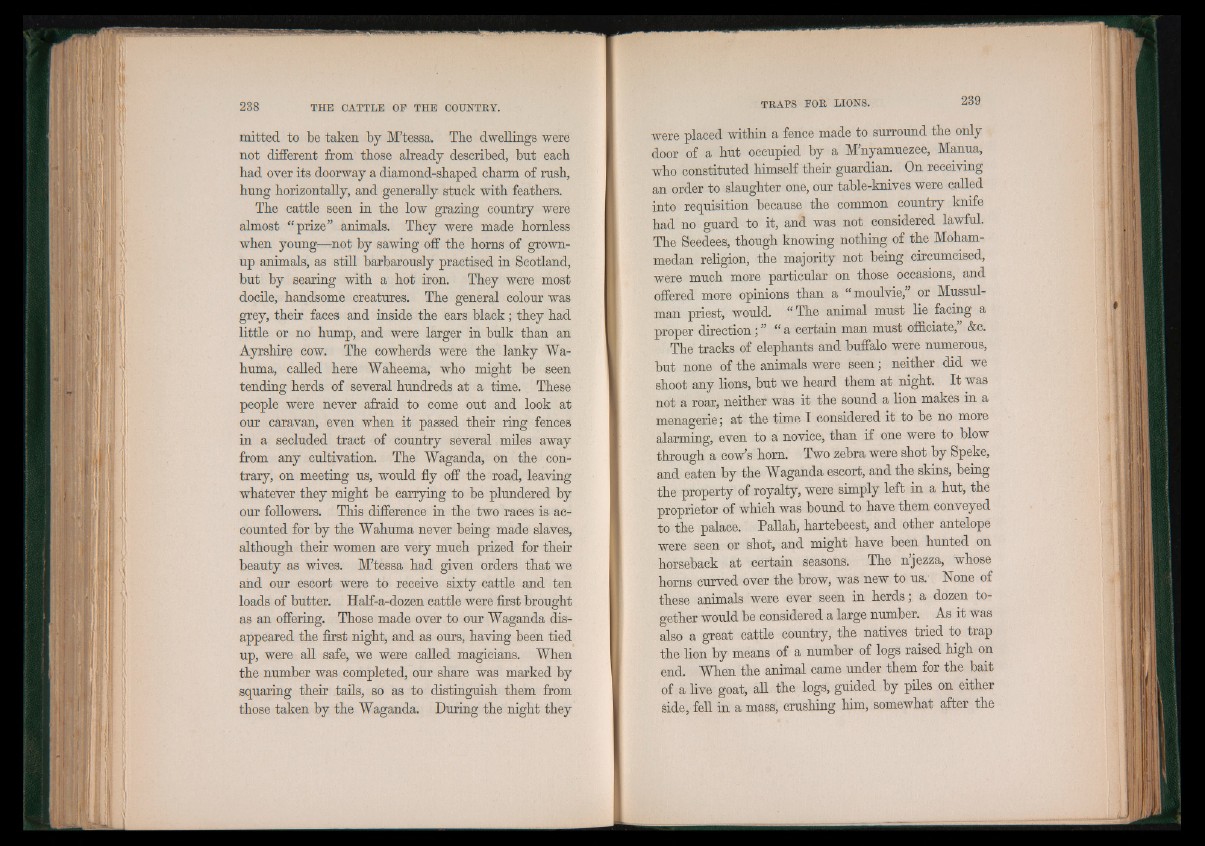
xnitted to be taken by M’tessa. The dwellings were
not different from those already described, but each
had over its doorway a diamond-shaped charm of rush,
hung horizontally, and generally stuck with feathers.
The cattle seen in the low grazing country were
almost “ prize” animals. They were made hornless
when young—not by sawing off the horns of grownup
animals, as still barbarously practised in Scotland,
but by searing with a hot iron. They were most
docile, handsome creatures. The general colour was
grey, their faces and inside the ears black; they had
little or no hump, and were larger in bulk than an
Ayrshire cow. The cowherds were the lanky Wa-
huma, called here Waheema, who might be seen
tending herds of several hundreds at a time. These
people were never afraid to come out and look at
our caravan, even when it passed their ring fences
in a secluded tract of country several miles away
from any cultivation. The Waganda, on the contrary,
on meeting us, would fly off the road, leaving
whatever they might be carrying to be plundered by
our followers. This difference in the two races is accounted
for by the Wahuma never being made slaves,
although their women are very much prized for their
beauty as wives. M’tessa had given orders that we
and our escort were to receive sixty cattle and ten
loads of butter. Half-a-dozen cattle were first brought
as an offering. Those made over to our Waganda disappeared
the first night, and as ours, having been tied
up, were all safe, we were called magicians. When
the number was completed, our share was marked by
squaring their tails, so as to distinguish them from
those taken by the Waganda. During the night they
were placed within a fence made to surround the only
door of a hut occupied by a M’nyamuezee, Manua,
who constituted himself their guardian. On receiving
an order to slaughter one, our table-knives were called
into requisition because the common country knife
had no guard to it, and was not considered lawful.
The Seedees, though knowing nothing of the Mohammedan
religion, the majority not being circumcised,
were much more particular on those occasions, and
offered more opinions than a “ moulvie,” or Mussulman
priest, would. “ The animal must lie facing a
proper direction; ” “ a certain man must officiate,” &c.
The tracks of elephants and buffalo were numerous,
but none of the animals were seen; neither did we
shoot any lions, but we heard them at night. It was
not a roar, neither was it the sound a lion makes in a
menagerie; at the time I considered it to be no more
alarming, even to a novice, than if one were to blow
through a cow’s horn. Two zebra were shot by Speke,
and eaten by the Waganda escort, and the skins, being
the property of royalty, were simply left in a hut, the
proprietor of which was bound to have them conveyed
to the palace. Pallah, hartebeest, and other antelope
were seen or shot, and might have been hunted on
horseback at certain seasons. The n’jezza, whose
horns curved over the brow, was new to us. None of
these animals were ever seen in herds; a dozen together
would be considered a large number. As it was
also a great cattle country, the natives tried to trap
the lion by means of a number of logs raised high on
end. When the animal came under them for the bait
of a live goat, all the logs, guided by piles on either
side, fell in a mass, crushing him, somewhat after the